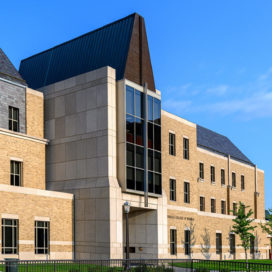Now, it’s time to wait …
Published: November 23, 2005 / Author: James Fosmoe
SOUTH BEND — And now we wait.
A U.S. Department of Transportation hearing on Monday at Indiana University South Bend provided the penultimate moment in the long countdown to determining which time zone Indiana and its various counties should be in.
Monday’s public hearing, the fourth and last held by the DOT, was intended to gauge public opinion on the always controversial time zone issue.
The hearing drew a crowd of about 300 people, most eager to provide their opinions about which time zone is best for counties in north central Indiana.
One prevailing sentiment was expressed by many who stepped to the microphone: St. Joseph, Elkhart, Marshall and Kosciusko counties should be in the same time zone.
As things now stand, St. Joseph County has filed a petition with the DOT to move the county into the Central time zone. Elkhart County officials have decided to stay with the majority of Indiana in the Eastern time zone.
Monday’s public hearing, the fourth and last held by the DOT in the state, was intended to gauge public opinion on the always controversial time zone issue.
It lasted until 10:40 p.m., well beyond the scheduled five hours, and recorded statements from 96 people during the hearing and 80 more who made separate video presentations.
The DOT will make a decision in January, said Judy Kaleta, DOT’s senior counsel for dispute resolution, who ran the hearing. Changes to Indiana’s time zone boundary, if any, will take effect when the nation switches to daylight-saving time on April 2.
The hearing drew a crowd of about 300 people, most eager to provide their opinions about which time zone is best for counties in north central Indiana.
One prevailing sentiment was expressed by many who stepped to the microphone: St. Joseph and Elkhart counties should be in the same time zone.
But not all. Many, such as John B. Mountsier, president of I/N Tek I/N Kote, said his company favored Central time for St. Joseph County.
Mountsier noted that Central time is more efficient in terms of dealing with his parent company in Japan, steel materials shipped from Lake County and for the firm’s 485 employees.
Greg Ayers, executive director of the South Bend/Mishawaka Convention and Visitors Bureau, was just as adamant in support of Eastern time.
A move to Central time, Ayers said, would give Fort Wayne a competitive advantage, confuse travelers and even cause the South Bend Silver Hawks to decide what time to begin games so as to maximize attendance.
Kevin Brinegar, president of the Indiana State Chamber of Commerce, noting the DOT’s promise not to change time zones in counties that did not request a change, said the only way for area counties to stay unified is for St. Joseph and Marshall counties to remain on Eastern time.
John Gaski, associate professor of marketing at the University of Notre Dame, urged the DOT to take advantage of a “rare opportunity to solve our regional dilemma” and put St. Joseph County on Central time. “Elkhart County had their chance,” Gaski said. “You can’t let the tail wag the dog.”
St. Joseph County Commissioner Steve Ross, D-District 1, urged the DOT not to remove St. Joseph County from a commercial corridor he says extends from South Bend through Chicago to Kenosha, Wis. “If you remove us from that, you are basically isolating us from the area we do business with,” Ross said.
Elkhart County Commissioner Terry Rodino explained that Elkhart County officials chose to go along with Eastern time and not petition the DOT for a switch to Central. “When we heard St. Joseph County was doing it, we were very surprised,” he said.
Rodino said he feels the St. Joseph County Commissioners failed to make a convincing case for Central time and asked that their petition be denied.
A survey conducted by the Michiana Area Council of Governments clearly indicated the economic benefits of this region being in the Eastern time zone, he said. “Unfortunately, the St. Joseph County Commissioners chose to ignore the evidence,” he said.
St. Joseph County Commissioner Mark Dobson supported keeping his county in the Eastern time zone. Fellow Commissioner Cindy Bodle supported the petition for Central time but later acknowledged the importance of being on the same time as Elkhart and other counties belonging to the Michiana Area Council of Governments.
The hearing drew speakers from as far away as Marcellus, Chesterton and Fort Wayne.
“ Elkhart County is the spoiler blocking the wishes of the other counties,” said Melvyn Silver, a St. Joseph County resident. “I think you should reconsider whether being in sync with South Bend would outweigh the advantages of being in sync with Shipshewana,” he suggested to Elkhart leaders.
St. Joseph County resident Andrew Litka said people coming to this region to attend Notre Dame football games have no reason to go to Elkhart. “If we should chose to split (from Elkhart), it’s perfectly OK with me,” he said.
St. Joseph County resident Jessica Maich questioned why Indiana must split itself to serve the interests of other regions. “Why are we so willing to carve ourselves apart for the convenience of big cities?” she asked.
St. Joseph County resident Michael Germann suggested area schools should consider summer classes so children wouldn’t have to wait in winter darkness for school buses.
“I strongly believe St. Joseph County should remain in the Eastern time zone,” said Craig MacNab, director of public relations for AM General, which manufactures Hummers. Three times as many Hummers are shipped east than to any other area of the country, he said.
David Troxell, of Cass County, Mich., said he favors Eastern time because it provides more daylight for evening recreational activities.
Several speakers said educational institutions, including IUSB and Indiana Tech, will be at a disadvantage if some of their locations in this region are on Eastern and others on Central time.
Rob Bartels, president of Martin’s Super Markets, said 20 percent of his work force will be affected if the region is split into two time zones. Making deliveries across a patchwork of counties in different time zones would be extremely difficult, he said.
John Parsons, a representative for the South Shore Railroad, urged approving the St. Joseph County request to switch to Central time.
Jane Ralser, of Granger, said her marketing and business consulting firm has a majority of customers on the West Coast. “We fairly cut off our ability to grow in the western part of the U.S. if we are three hours ahead instead of two,” she said.
Some speakers urged that Central time prevail so there will be more daylight in the mornings to enhance the safety of children walking to school or waiting for school buses. Others said Eastern time would provide more light in the evening and thus more quality recreational time for families.
# # #
/news_and_events/news_articles/article/3675/now-it-s-time-to-wait
Related Stories




